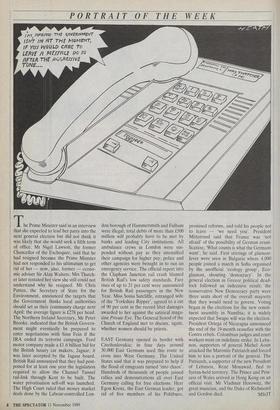PORTRAIT OF THE WEEK
The Prime Minister said in an interview that she expected to lead her party into the next general election but did not think it was likely that she would seek a fifth term o office. Mr Nigel Lawson, the former Chancellor of the Exchequer, said that he had resigned because the Prime Minister had not responded to his ultimatum to get rid of her — now, also, former — econo- mic adviser Sir Alan Walters; Mrs Thatch- er later restated her view she still could not understand why he resigned. Mr Chris Patten, the Secretary of State for the Environment, announced the targets that the Government thinks local authorities should set as their community charge next April: the average figure is £278 per head. The Northern Ireland Secretary, Mr Peter Brooke, indicated that the British Govern- ment might eventually be prepared to enter negotiations with Sinn Fein if the IRA ended its terrorist campaign. Ford motor company made a £1.6 billion bid for the British luxury car makers, Jaguar; it was later accepted by the Jaguar board. British Rail announced that they had post- poned for at least one year the legislation required to allow the Channel Tunnel rail-link through Kent to be built. The water privatisation sell-off was launched. The High Court ruled that money market deals done by the Labour-controlled Lon- don borough of Hammersmith and Fulham were illegal; total debts of more than £500 million will probably have to be met by banks and leading City institutions. All ambulance crews in London were sus- pended without, pay as they intensified their campaign for higher pay; police and other agencies were brought in to run an emergency service. The official report into the Clapham Junction rail crash blamed British Rail's low safety standards. Fare rises of up to 21 per cent were announced for British Rail passengers in the New Year. Miss Sonia Sutcliffe, estranged wife of the 'Yorkshire Ripper', agreed to a cut of 90 per cent in the record libel damages awarded to her against the satirical maga- zine Private Eye. The General Synod of the Church of England met to discuss, again, whether women should be priests.
EAST Germany opened its border with Czechoslovakia; in four days around 30,000 East Germans used this route to cross into West Germany. The United States said that it was prepared to help if the flood of emigrants turned 'into chaos'. Hundreds of thousands of people joined rallies and demonstrations all over East Germany calling for free elections. Herr Egon Krenz, the East German leader, got rid of five members of his Politburo,
promised reforms, and told his people not to leave — 'we need you'. President Mitterrand said that France was `not afraid' of the possibility of German reuni- fication; 'What counts is what the Germans want', he said. First stirrings of glasnost- fever were seen in Bulgaria where 4,000 people joined a march in Sofia organised by the unofficial 'ecology group', Eco- glasnost, shouting 'democracy'. In the general election in Greece political dead- lock followed an indecisive result; the conservative New Democracy party were three seats short of the overall majority that they would need to govern. Voting began in the elections for the new consti- tuent assembly in Namibia; it is widely expected that Swapo will win the election. President Ortega of Nicaragua announced the end of the 19-month ceasefire with the Contra rebels. Colombian judges and court workers went on indefinite strike. In Leba- non, supporters of general Michel Aoun attacked the Maronite Patriarch and forced him to kiss a portrait of the general. The Patriarch, a supporter of the new President of Lebanon, Rene Mouawad, fled to Syrian-held territory. The Prince and Prin- cess of Wales arrived in Hong Kong on an official visit. Mr Vladimir Horowitz, the great musician, and the Duke of Richmond










































































 Previous page
Previous page